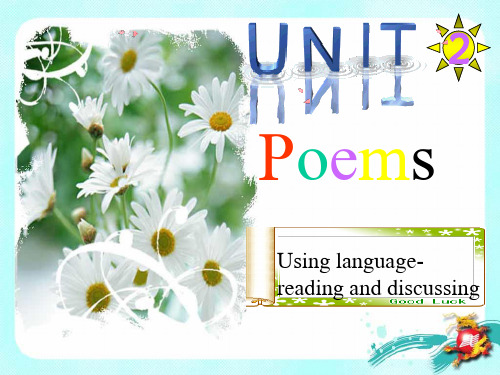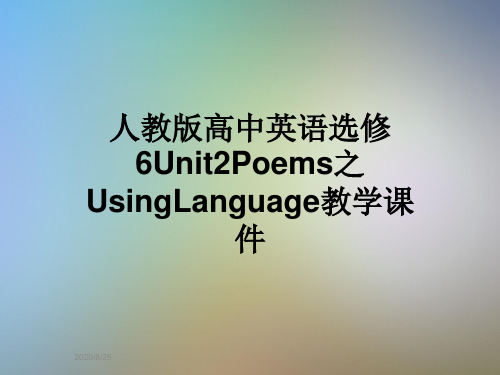新课标人教高中英语选修六课件:Unit 2 Using Language
合集下载
2017年【人教版】高中英语选修六:Unit 2 Using language 课件

But if you’ve a need for love I’ll give you all I own It might help you down the road Till you’ve found your own. (eaker in the poem and who is he /she speaking to? Give reasons to support your answer. The speaker is probably a parent because he / she is offering the child unconditional love (But if you’ve a need for love, I’ll give you all I own.)
The rhyming words in the last four lines are unusual because they are the same word although they each have a different meaning.
2) Try beating or clapping the strong beats of the rhythm as you read the poem to yourself. Now listen to the poem again and clap the strong beats.
1. Listen to the poem ‘I’ve saved the summer’ and answer these questions. (answers are free) 1) Do you think the speaker in the poem is more likely to be a girlfriend /boyfriend or parent? 2) Does the poem have a rhythmic pattern?
人教版高二英语选修6课件 Unit 2 Poems Using language

The answers lie
somewhere
At the bottom of the day. But if you’ve a need for love I’ll give you all I own
your smile
It might help you down
When you were but nineteen. the road
‘ I’ve saved the summer’ is his last
work.
Reading
Let’s learn the poem written by Rod Mckuen.
I’ve Saved the Summer
I’ve saved the summer And I give it all to you To hold on winter mornings When the snow is new. 我把夏天省下, 全部交给了你。 当雪儿初降时, 让冬天的早晨停住。
The rhyming words in the last four lines are unusual, because they are the same word (although they each
have a different meanings) .
Now, let’s read ‘I’ve saved the summer’.
make you feel something or think about omething? What did it make you feel or think about?
Now read ‘I’ve saved the summer’.
1. Circle the words that rhyme. What is unusual about the rhyming words
高中英语选修六 Unit2 using language 课件

Ⅰ.基础词汇 1.bare adj. 赤裸的;光秃的;稀少的 n. 最基本的要素 2.appropriate adj. 适当的;正当的 3.exchange n. 交换;交流;互换 vt.& vi. 调换;交换 4.diploma n. 毕业文凭;学位证书 5.sponsor n. 赞助人;主办者;倡议者 vt. 发起;举办;倡议 6.blank n. 空白 adj. 空白的;茫然的 7.championship n. 冠军称号 8.scholarship n. 奖学金;学问;学术成就 9.load n. 负担;负荷物(尤指沉重的)
• Ⅱ.拓展词汇 • 1.bride n.新娘→bridegroom n.新郎 • 2.darkness n.黑暗;漆黑→darken v.(使) 变黑→dark adj.黑暗的 • 3.warmth n.暖和;温暖→warm adj.暖和的; 温暖的 • vt.&vi.使变暖 • 4.pianist n.钢琴家;钢琴演奏者→piano n.钢琴 • 5.violinist n.小提琴家;小提琴演奏者 →violin n.小提琴
Task2:重点短语要牢记
• •ve_fun 得高兴 3.hold_on 别挂断;继续;坚持;保持 4.by_oneself 独自地;独立地 5.try_out 测试;试验;尝试 6.let_out 发出;放走;泄露
• Step 1 Read the text and answer the following question. • Who is the speaker in the poem and who is he/she speaking to? A_parent_(mother_or_father)_speaking_to _a_young_adult_child.__He_is_speaking_ to_his_son._
• Ⅱ.拓展词汇 • 1.bride n.新娘→bridegroom n.新郎 • 2.darkness n.黑暗;漆黑→darken v.(使) 变黑→dark adj.黑暗的 • 3.warmth n.暖和;温暖→warm adj.暖和的; 温暖的 • vt.&vi.使变暖 • 4.pianist n.钢琴家;钢琴演奏者→piano n.钢琴 • 5.violinist n.小提琴家;小提琴演奏者 →violin n.小提琴
Task2:重点短语要牢记
• •ve_fun 得高兴 3.hold_on 别挂断;继续;坚持;保持 4.by_oneself 独自地;独立地 5.try_out 测试;试验;尝试 6.let_out 发出;放走;泄露
• Step 1 Read the text and answer the following question. • Who is the speaker in the poem and who is he/she speaking to? A_parent_(mother_or_father)_speaking_to _a_young_adult_child.__He_is_speaking_ to_his_son._
人教版高中英语选修6Unit2Poems之UsingLanguage教学课件

Do you know the English translation of the words below?
诗歌 诗人 诗歌(总称)
poem poet poetry
韵, 压韵的词 (n.) 压韵 (v.) 节奏 (n.)
rhyme rhythm
有节奏的 (adj.) rhythmic
Rhyme and rhythm are essential to poetry. Without rhythm, there wouldn’t be poems.
——李煜《虞美人》
Let’s learn A few simple forms of English poems
Fast reading
1.How many kinds of poems did the text mention? What are they?
童谣
Nursery rhymes
清单诗
AB CDE FGH
is recited to a baby? √
describes a river scene?
√
has rhyming words at
the end of lines?
√√
repeats words or phrases?
√√ √
Forms of poems feature
Nursery rhymes Strong rhythm and rhyme, a lot of repetition, easy to learn and to recite
Free form
Nursery rhymes
HPuoshe,mlittAle bisabay,nduonr’stesrayyarwhoyrmd,e that
人教版选修六 unit 2 poems using language 课件

And for myself I’ve kept your smile When you were but nineteen Till you are older you’ll not know What brave young smiles can mean.
I know no answers To help you on your wwaayy The answers lie somewhere At the bottom of the day.
No.
What do they use to express their feelings?
poem 赠汪伦 游子吟 相思
the things used to express the feeling The depth of the spring The thread through mother’s fingers
1. Flowers: dancing in the wind 2. Willow(柳树) branches:waving to me
3. Birds: singing to me
4. Inner mind: dropping into a honey jam
When you are feeling extremely sad, what images can be used to express it?
The love peas
We call the things that a poet uses to express his/ her feelings images(意象)
Imagery appreciation
The first strophe (诗节)
image summer
人教版英语选修六Unit 2 Poems using language PPT课件

Lucy
by surrounding herself with familiar things in her own house
Pitt
Step II: Read the poem and answer.
• 1.Circle the words that rhyme. What is unusual about the rhyming words in the last four lines?
You / new; need/ feed; nineteen/ mean Way/day; own/ own
message? Give a reason for your choice.
A If it's cold, I'll warm you; if it's dark, I'll give you light; if you're hungry, I'll feed you; if you want love, I'll give it to you.
about a poetry competition. Listen to Part I of the tape and answer these questions in pairs.
1 Who has written a poem already and is ready to enter the competition? Lucy
4. Translate the poem into Chinese and share your work with your partner's. Be ready to present it to the class.
人教版选修六 Book 6 Unit 2 Using language 课件共27张ppt

5
I will give you sunlight when you are
in darkness
I’ve saved the summer And I give it all to you To hold on winter mornings When the snow is new. I’ve saved some sunlight If you should ever need A place away from darkness Where your mind can feed.
Listen and follow the tape.
Task 1 Who did Rod Mckuen write this poem to?
பைடு நூலகம்ask 2
Which of the following is the closest to the
speaker’s message?
A. If it’s cold, I’ll warm you; if it’s dark, I’ll give you light; if you’re hungry, I’ll feed you; if you want to love, I’ll give it to you.
B. Although the future may be difficult for you, whatever you need warmth and love, remember I’ll have some to give you.
C. While you’re away I’ll remember your smile and I’ll love you always. When you return, I hope you will love me.
人教版高中英语选修六Unit2 Using Language 课件

How to express your ideas in a poetic way? By using images.
Try creating your own images
When you are feeling extremely happy, what images can be used to express it?
The third strophe
1. What does the age “nineteen” mean? It means being grown-up/ an adult. 2. When does the writer keep his child’s smiles? He keeps the smiles before the child becomes an adult.
warmth
Winter mornings/ cold snow
the explanation
I will give you wa_r_m__t_h_ which I have s_a_v_e_d_ when you feel c_o_ld_.
Imagery appreciation
The second strophe
Discussion
2. Who is the speaker in the poem and who is he /she speaking to? The writer may be a parent, and he/ she is speaking to his/ her child.
Does a poet express his/ her feelings directly?
Kind of feelings friendship
Try creating your own images
When you are feeling extremely happy, what images can be used to express it?
The third strophe
1. What does the age “nineteen” mean? It means being grown-up/ an adult. 2. When does the writer keep his child’s smiles? He keeps the smiles before the child becomes an adult.
warmth
Winter mornings/ cold snow
the explanation
I will give you wa_r_m__t_h_ which I have s_a_v_e_d_ when you feel c_o_ld_.
Imagery appreciation
The second strophe
Discussion
2. Who is the speaker in the poem and who is he /she speaking to? The writer may be a parent, and he/ she is speaking to his/ her child.
Does a poet express his/ her feelings directly?
Kind of feelings friendship
相关主题
